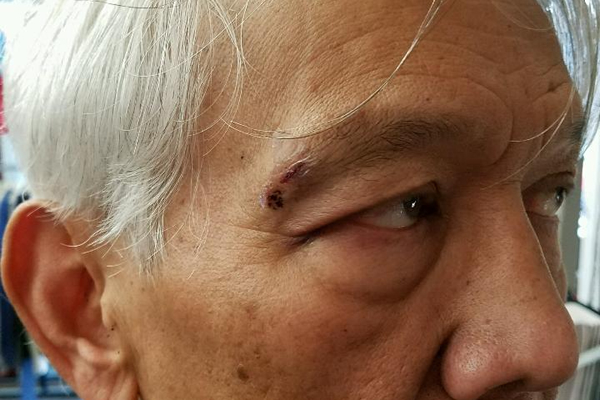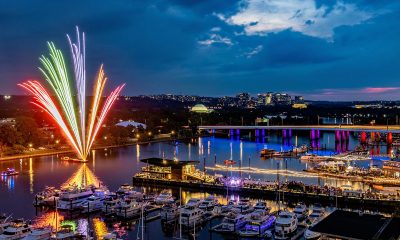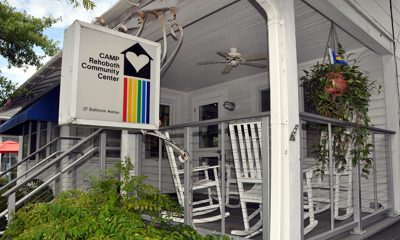Local
Del. gay man who alleged police abuse found guilty
Anti-gay bias allegation not mentioned in trial
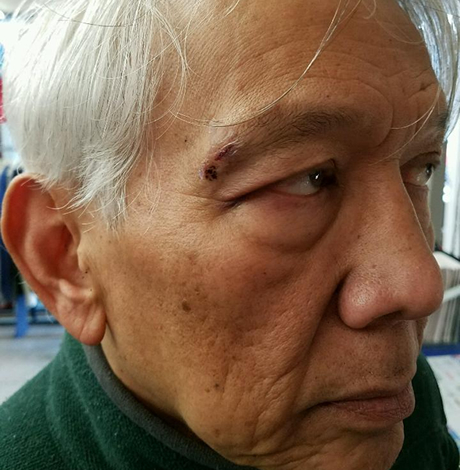
GEORGETOWN, Del. — A 66-year-old gay man who filed a complaint against a police officer in Lewes, Del., for allegedly using excessive force to arrest him in January during an altercation at a hospital emergency room was found guilty by a Delaware judge on Tuesday on misdemeanor charges of disorderly conduct, menacing, and resisting arrest.
Judge Rosemary Beauregard of the Sussex County Court of Common Pleas announced at the conclusion of a non-jury trial in Georgetown, Del., that a state prosecutor proved beyond a reasonable doubt that Robaire G. Lizama engaged in “hysterical and abusive” behavior at the hospital that justified his arrest and confirmed he committed the three offenses.
In a development that court observers said was routine for a misdemeanor case like this one, Beauregard handed down an immediate sentence for Lizama that included a 30-day suspended jail term, six months of court-monitored probation, and a $600 fine plus $57 in court reimbursement costs.
In another development likely to surprise LGBT activists familiar with the case, Lizama’s public defender attorney Heather Lingo made no mention during the trial of Lizama’s written complaint to the Lewes Police Department in February alleging that the arresting officer singled him out because he’s gay.
When approached by the Blade after the trial Lingo declined to comment, saying she would have nothing more to say about the case.
“I don’t think he would grab a straight man, bear hug him and then body slam him to the ground and try to tell him he’s being arrested,” Lizama told the Washington Blade at the time he filed his complaint with Lewes Police Chief Thomas Sell in February.
Lizama, a former D.C. resident who lives in Lewes, has accused Officer Tyrone Woodyard of fabricating the charges against him after throwing him to the floor, causing a head injury during a Jan. 25 incident at Beebe Healthcare, a hospital in Lewes.
The arrest report prepared by Woodyard says Lizama had been acting in a disorderly manner after he accompanied a female friend to the emergency room who had been experiencing chest pain. Lizama testified at the trial that he was concerned that nurses who admitted and began to treat his friend weren’t being compassionate in their handling of the situation.
He denied he acted in a threatening or menacing way or that he refused to leave the emergency room when asked to do so by one of the nurses.
Jaqueline Marshall, the emergency room nurse who participated in the treatment of Lizama’s friend, and hospital security officer Julian Peacock testified that Lizama – while understandably upset that his friend may have been suffering from a heart attack – behaved in such an aggressive and hysterical way that the nursing staff became alarmed and felt threatened.
Marshall, Peacock and Officer Woodyard each testified that Lizama “lunged” at Woodyard while Woodyard and Peacock were escorting Lizama out of the emergency room area to the hospital’s lobby, where they told him he would have to wait while his friend was treated.
Woodyard told the court he couldn’t immediately determine whether Lizama was armed when Lizama suddenly turned toward him in an aggressive way. He said he decided to “taken him down” on the floor out of concern that Lizama could have harmed the nurses and others walking through the emergency room area.
Woodyard and Peacock testified that when Woodyard tried to handcuff Lizama after telling him he was under arrest, Lizama resisted the officer’s attempts to place cuffs on one of his hands and struggled with the officer and Peacock on the floor. This prompted another nurse to enter the fray and assist in restraining Lizama, the two testified.
Lizama testified that he turned toward Woodyard because he was trying to find his way to the entrance to the hospital lobby and in no way was attempting to attack or harm Woodyard. He said he didn’t resist the officer’s attempt to handcuff him but was moving about because he was in pain and was trying to place his hand over his forehead above his eye, which was bleeding after his head struck the floor when Woodyard knocked him down.
In response to questioning by Lingo, Marshall and Peacock acknowledged that Lizama was admitted to the emergency department for treatment after his arrest. Lingo presented a photo of Lizama as evidence that showed a gash over his eye and pointed to Lizama’s testimony that the injury required a plastic bandage to stop the bleeding,
Assistant State Attorney General Paul Seward, the lead prosecutor in the case, presented as evidence a video recording taken from the hospital’s security cameras that shows Lizama and his friend enter the hospital’s emergency department. The video footage shows Lizama moving about and raising his arms in what appeared to be an agitated state as he talked to one of the nurses at the admissions desk.
Beauregard said she based her verdict on what she called “credible and consistent” testimony by Marshall, Peacock and Woodward. She said the three witnesses along with the video recording at the trial convinced her that Lizama’s behavior was, in fact, posing a potential danger to the hospital staff and other visitors and proved he committed the misdemeanor offenses of disorderly conduct, menacing and resisting arrest.
The judge called Lizama’s testimony at the trial “inconsistent” and “contradictory.”
“All three of those witnesses thought something bad was going to happen,” she said. “He put the public at risk and he put his friend at risk,” said Beauregard, saying the disturbance Lizama was creating could have interfered with the nurses’ and doctors’ effort to diagnose and treat the friend.
It was later determined that the friend did not have a heart attack.
Lizama told the Blade after the trial that he had told Lingo, his attorney, about his belief that Officer Woodyard targeted him because he’s gay. He said he doesn’t know why Lingo didn’t raise that concern during the trial.
He has acknowledged that he doesn’t recall Woodyard making anti-gay remarks or making a reference to his sexual orientation at the time of the arrest but said he nevertheless got the impression that the officer assumed he’s gay.
When approached after the trial and asked by the Blade about Lizama’s allegation of anti-gay bias, Officer Woodyard refused to comment, saying he wasn’t authorized to speak to the media.
“I’m totally shocked,” Lizama said of the judge’s guilty verdict in an interview after the trial.
He said Lingo suggested he accept a plea bargain offer that Seward made minutes before the start of the trial. Still reeling over the verdict, Lizama said he didn’t remember what the terms of the plea offer consisted of.
“I told my attorney if I don’t think I’m guilty why would I plead guilty?” said Lizama. “I wholeheartedly didn’t think I was guilty so I said no. I wanted to go with the trial.”
District of Columbia
New D.C. LGBTQ+ bar Crush set to open April 19
An ‘all-inclusive entertainment haven,’ with dance floor, roof deck

D.C.’s newest LGBTQ+ bar called Crush is scheduled to open for business at 4 p.m. on Friday, April 19, in a spacious, two-story building with a dance floor and roof deck at 2007 14th St., N.W. in one of the city’s bustling nightlife areas.
A statement released by co-owners Stephen Rutgers and Mark Rutstein earlier this year says the new bar will provide an atmosphere that blends “nostalgia with contemporary nightlife” in a building that was home to a popular music store and radio supply shop.
Rutgers said the opening comes one day after Crush received final approval of its liquor license that was transferred from the Owl Room, a bar that operated in the same building before closing Dec. 31 of last year. The official opening also comes three days after Crush hosted a pre-opening reception for family, friends, and community members on Tuesday, April 16.
Among those attending, Rutgers said, were officials with several prominent local LGBTQ organizations, including officials with the DC Center for the LGBTQ Community, which is located across the street from Crush in the city’s Reeves Center municipal building. Also attending were Japer Bowles, director of the Mayor’s Office of LGBTQ Affairs, and Salah Czapary, director of the Mayor’s Office of Nightlife and Culture.
Rutgers said Crush plans to hold a grand opening event in a few weeks after he, Rutstein and the bar’s employees become settled into their newly opened operations.
“Step into a venue where inclusivity isn’t just a promise but a vibrant reality,” a statement posted on the Crush website says. “Imagine an all-inclusive entertainment haven where diversity isn’t just celebrated, it’s embraced as the very heartbeat of our venue,” the statement says. “Welcome to a place where love knows no bounds, and the only color or preference that matters is the vibrant tapestry of humanity itself. Welcome to Crush.”
The website says Crush will be open Tuesdays and Wednesdays from 4 p.m. to 12 a.m., Thursdays from 4 p.m. to 2 a.m., Fridays from 4 p.m. to 3 a.m., Saturdays from 2 p.m. to 3 a.m., and Sundays from 2 p.m. to 12 a.m. It will be closed on Mondays.
Crush is located less than two blocks from the U Street Metro station.
District of Columbia
Reenactment of first gay rights picket at White House draws interest of tourists
LGBTQ activists carry signs from historic 1965 protest

About 30 LGBTQ activists formed a circular picket line in front of the White House Wednesday afternoon, April 17, carrying signs calling for an end to discrimination against “homosexuals” in a reenactment of the first gay rights protest at the White House that took place 59 years earlier on April 17, 1965.
Crowds of tourists looked on with interest as the activists walked back and forth in silence in front of the White House fence on Pennsylvania Avenue. Like the 1965 event, several of the men were dressed in suits and ties and the women in dresses in keeping with a 1960s era dress code policy for protests of the Mattachine Society of Washington, D.C., the city’s first gay rights group that organized the 1965 event.
Wednesday’s reenactment was organized by D.C.’s Rainbow History Project, which made it clear that the event was not intended as a protest against President Joe Biden and his administration, which the group praised as a strong supporter of LGBTQ rights.
“I think this was an amazing event,” said Vincent Slatt, the Rainbow History Project official who led efforts to put on the event. “We had twice as many that we had hoped for that came today,” he said.
“It was so great to see a reenactment and so great to see how far we’ve come,” Slatt said. “And also, the acknowledgement of what else we still need to do.”
Slatt said participants in the event who were not carrying picket signs handed out literature explaining the purpose of the event.
A flier handed out by participants noted that among the demands of the protesters at the 1965 event were to end the ban on homosexuals from working in the federal government, an end to the ban on gays serving in the military, an end to the denial of security clearances for gays, and an end of the government’s refusal to meet with the LGBTQ community.
“The other thing that I think is really, really moving is some of the gay staff inside the White House found out this was happening and came out to greet us,” Slatt said. He noted that this highlighted how much has changed since 1965, when then President Lyndon Johnson’s White House refused to respond to a letter sent to Johnson from the Mattachine Society explaining its grievances.
“So now to have gay people in the White House coming out to give us their respects and to say hello was especially meaningful to us,” Slatt said. “That was not expected today.”
Among those walking the picket line was longtime D.C. LGBTQ rights advocate Paul Kuntzler, who is the only known surviving person who was among the White House picketers at the April 1965 event. Kuntzler said he proudly carried a newly printed version of the sign at Wednesday’s reenactment event that he carried during the 1965 protest. It stated, “Fifteen Million Homosexuals Protest Federal Treatment.”
Also participating in the event was Japer Bowles, director of D.C. Mayor Muriel Bowser’s Office of LGBTQ Affairs. Bowles presented Slatt with a proclamation issued by Bowser declaring April 17, 2024, Mattachine Society Day in Washington, D.C.
“Whereas, on April 17, 1965, the Mattachine Society of Washington courageously held the nation’s inaugural picket for gay rights, a seminal moment in the ongoing struggle for LGBTQIA+ equality in the United States, marking the genesis of public demonstrations advocating for those rights and paving the way for Pride Marches and Pride celebrations worldwide,” the proclamation states.
About 30 minutes after the reenactment event began, uniformed Secret Service agents informed Slatt that due to a security issue the picketers would have to move off the sidewalk in front of the White House and resume the picketing across the street on the sidewalk in front of Lafayette Park. When asked by the Washington Blade what the security issue was about, one of the Secret Service officers said he did not have any further details other than that his superiors informed him that the White House sidewalk would have to be temporarily cleared of all people.
Participants in the event quickly resumed their picket line on the sidewalk in front of Lafayette Park for another 30 minutes or so in keeping with the 1965 picketing event, which lasted for one hour, from 4:20 p.m. to 5:20 p.m., according to Rainbow History Project’s research into the 1965 event.
Although the LGBTQ picketers continued their procession in silence, a separate protest in Lafayette Park a short distance from the LGBTQ picketers included speakers shouting through amplified speakers. The protest was against the government of Saudi Arabia and organized by a Muslim group called Al Baqee Organization.
A statement released by the Rainbow History Project says the reenactment event, among other things, was a tribute to D.C.-area lesbian rights advocate Lilli Vincenz, who participated in the 1965 White House picketing, and D.C. gay rights pioneer Frank Kameny, who founded the Mattachine Society of Washington in the early 1960s and was the lead organizer of the 1965 White House protest. Kameny died in 2011 and Vincenz died in 2023.
The picket signs carried by participants in the reenactment event, which were reproduced from the 1965 event, had these messages:
• “DISCRIMINATION Against Homosexuals is as immoral as Discrimination Against Negroes and Jews;”
• “Government Should Combat Prejudice NOT PROMOTE IT”
• “White House Refuses Replies to Our Letters, AFRAID OF US?
• “HOMOSEXUALS Died for their Country, Too”
• “First Class Citizenship for HOMOSEXUALS”
• “Sexual Preference is Irrelevant to Employment”
• “Fifteen Million U.S. Homosexuals Protest Federal Treatment”
District of Columbia
Organizers announce details for D.C. Black Pride 2024
Most events to take place Memorial Day weekend at Westin Downtown
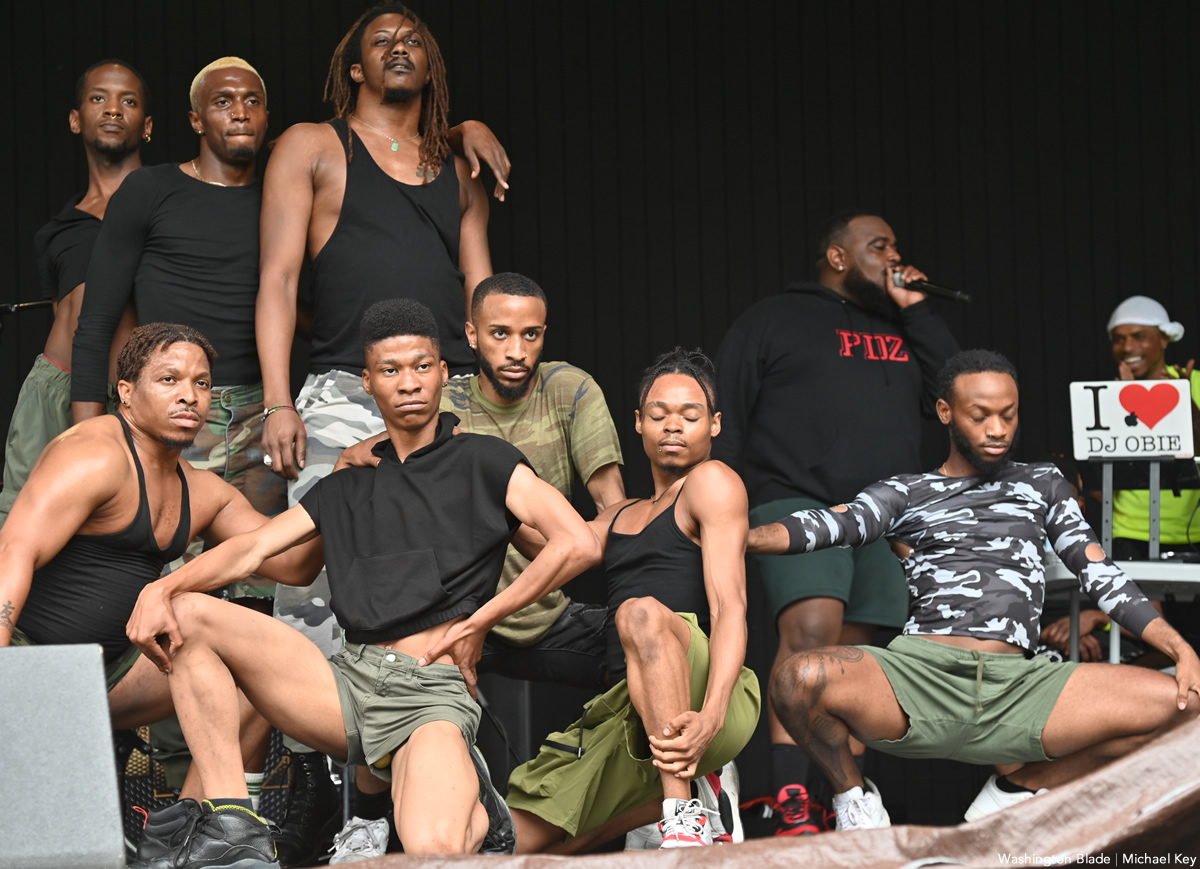
The Center for Black Equity, the organizer of D.C. Black Pride, the nation’s first and one of the largest annual African-American LGBTQ Pride celebrations, announced this year’s event will take place Memorial Day Weekend from May 24-27.
The announcement, released April 16, says that most 2024 D.C. Black Pride events will take place at the Westin Washington, D.C. Downtown Hotel at 999 9th St, N.W.
“With the theme Black Pride Forever, the event promises a weekend filled with vibrant celebrations, empowering workshops, and a deep exploration of Black LGBTQIA+ history and culture,” the announcement says.
It says events will include as in past years a “Rainbow Row” vendor expo at the hotel featuring “organizations and vendors created for and by the LGBTQIA+ community” offering products and services “that celebrate Black excellence.”
According to the announcement, other events include a Health and Wellness Festival that will offer workshops, demonstrations, and activities focused on “holistic well-being;” a Mary Bowman Poetry Slam “showcasing the power and beauty of spoken word by Black LGBTQIA+ artists;” the Black Pride Through the Decades Party, that will celebrate the “rich history of the Black LGBTQIA+ movement;” and an Empowerment Through Knowledge series of workshops that “delve into various topics relevant to the Black LGBTQIA+ community.”
Also, as in past years, this year’s D.C. Black Pride will feature its “Opening Night Extravaganza” reception and party that will include entertainment and live performances.
The announcement notes that D.C.’s annual Black Pride celebration, started in 1991 as a one-day outdoor event at Howard University’s Banneker Field, has inspired annual Black LGBTQ Pride events across the United States and in Canada, United Kingdom, Brazil, Africa, and the Caribbean. More than 300,000 people attend Black LGBTQ Pride events each year worldwide, the announcement says.
Full details, including the official schedule of events, can be accessed at dcblackpride.org.
-

 Africa4 days ago
Africa4 days agoCongolese lawmaker introduces anti-homosexuality bill
-

 District of Columbia14 hours ago
District of Columbia14 hours agoReenactment of first gay rights picket at White House draws interest of tourists
-

 World4 days ago
World4 days agoOut in the World: LGBTQ news from Europe and Asia
-

 Arizona18 hours ago
Arizona18 hours agoAriz. governor vetoes anti-transgender, Ten Commandments bill

